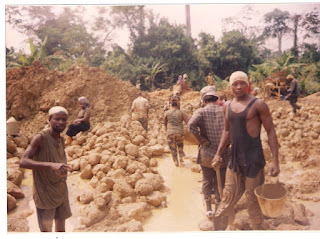 |
| Workers at Gold mining Site in Ghana |
However in 2011, the country saw a decline of 6 percent in gold production, as several companies were concentrating on long-term maintenance and expansion rather than actual production.
Export
of Gold from Ghana
Ghana has continually depended
heavily on a selected few commodities for exports. Gold is one of such
commodity. Doing this, Ghana has been able to safeguard its environment and
also entice foreign investment. The country has continuously been a major
producer of gold and today, it has the singular reputation of having one of the
biggest gold reserves in the world. Acknowledgments to the preemptive
initiatives taken by the government, gold exports are increasing with each
passing day. With the assistance of foreign investment, Ghana has been able to
improve in Gold output and furthermore generate substantial job prospects for
its people. The United Kingdom is Ghana’s largest export partner, but Ghana also exports gold to the European Union and the United States America.
Gold
Mining and Environmental Problems in Ghana
Over 90 percent of the Ghana
gold outputs come off from the Ashanti region of Ghana. The Ashanti Gold-fields
Corporation has recently modernized its operations and is now using
environmentally-friendly techniques to mine and process gold. Nevertheless, it
is the 10 percent outputs that is a disturbing factor. This 10 percent represent
small scale gold miners, who use old-fashioned and unsafe procedures to extract
gold. Consequently, rivers are being constantly diverted; air, water and ground
contamination has become a major problem in the country. In some areas, desertification
has occurred due to soil erosion and leaching. Most of these small scale miners
use mercury to remove gold from the sediments and this has caused contamination
of drinking water and groundwater. The locals’ residents are also suffering
from health problems, due to mercury poisoning. The surrounding flora and fauna
is not left out. The Ghana government is also considering opening up its forests for gold mining. Some foreign mining companies are ready to invest and generate thousands of jobs; the government is particularly desirous to help further its economy. Though, this could be devastating for the environment.
The
near Future of Gold Exports from Ghana
The Ghana government needs to
make sure that gold mining companies use modern and environmentally-friendly techniques
to extract gold. If this does not take place, the environment will be severely damaged
irreversibly and people in the nearby areas would not be fit sufficiently, even
physically and mentally, to take up jobs in the mining sector. This will end the
gold mining and gold exports. The challenge that the country is now facing is educating and imparting knowledge to the small scale local miners, and then assisting them to switch to a more modern and environmentally-friendly extraction procedures. Obviously this requires funding and, therefore, the government must look for private players and foreign investments.
Gold exports from Ghana will continue to increase, because the demand for this commodity is very high and will continue to remain on the high side. Nonetheless, the eventual cost of the exports perhaps maybe too high for Ghana to bear the burden alone.
NOTICE TO PROSPECTIVE GOLD and DIAMOND BUYERS
Ghana is gifted with mineral deposits for example gold, diamond, manganese and bauxite. There are also untapped economic deposits of iron ore, limestone, kaolin, feldspar and silica sands. We welcome all potential investors including persons who desire to deal in gold or other precious minerals in Ghana and are actually prepared to offer the necessary assistance.
Here in Ghana, one can only deal in gold or other precious minerals upon the grant of a valid license by the Minister of Lands and Natural Resources. For the avoidance of any doubt, anyone offering such minerals for sale should therefore hold such a license.
FCO (FULL CORPORATE OFFER)